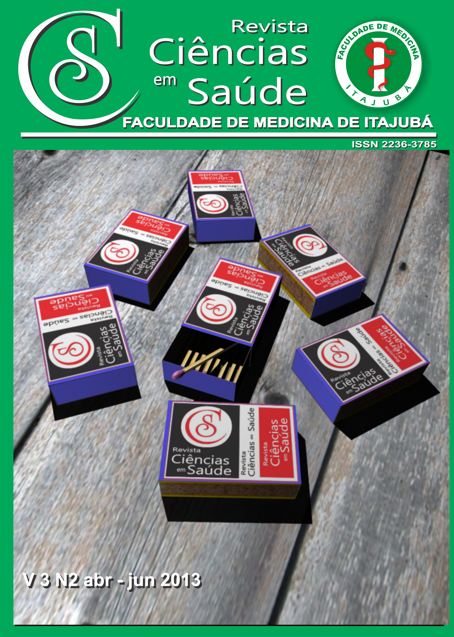Estudo da Atividade Antimicrobiana das Folhas de Jatrophacurcas L. frente ao Staphylococcus aureus e Escherichia coli/ Study of Antimicrobial Activity of Leave of Jatropha curcas L. against Staphylococcus aureus and Escherichia coli
Main Article Content
Abstract
Objetivos: O presente estudo investigou a atividade antimicrobiana do extrato obtido das folhas de Jatropha curcas L., frente às bactérias Staphylococcus aureus e Escherichia coli isoladas de pacientes de um Hospital Escola do sul de Minas Gerais. Metodologia: Foi realizado o teste da Microdiluição em placas de 96 poços. Colocou-se 50µl de Ágar Mueller Hinton em todos os poços, seguidos de 50µl do extrato da planta em diferentes concentrações (25 a 200 mg/mL) nas colunas apropriadas e em seguida, 10µl de cada cepa bacteriana na concentração de 0,5 de McFarland em solução salina estéril. Seguiu-se a incubação em estufa de 35ºC por 24h. Posteriormente, realizou-se a revelação pela adição de 20 µL de Cloreto de Trifenil Tetrezólico e análise dos resultados pela coloração. Em cada placa foi realizado um controle positivo e negativo. Resultados: Houve efeito inibitório do crescimento microbiano de S. aureus e E. coli perante extratos de Jatropha Curcas L. nas concentrações de 50mg a 200mg. Apenas na concentração de 25mg não houve efeito inibitório diante de E. coli e S. aureus. Conclusão: O extrato bruto de Jatropha curcas L. apresentou atividade inibitória do crescimento de colônias de Staphylococcus aureus e Escherichia coli isoladas de pacientes de um hospital escola do sul de Minas Gerais, nas concentrações 50, 75, 100, 125, 150, 175 e 200mg/ml.
Palavras-chave: Jatropha curcas L.; Antimicrobiano; Fitoterapia.
ABSTRACT
Objectives: This study investigated the antimicrobial activity of the extract obtained from the leaves of Jatropha curcas L., on the bacteria Staphylococcus aureus and Escherichia coli isolated from patients at a university hospital in southern Minas Gerais. Methodology: The microdilution test was made in plates of 96 wells. An amount of 50mL of Mueller Hinton agar was placed into each well, followed by 50mL of plant extract in different concentrations (25-200 mg / ml) in the appropriate columns, and then 10ml of each bacterial strain at a concentration of 0.5 McFarland in sterile saline solution. This was followed by incubation in an oven at 35°C temperature for 24h. Then development was performed by adding 20 µl Chloride Triphenyl Tetrezólico and analysis of results for staining. In each plate it was made a positive and a negative control. Results: There was a microbial growth inhibitory effect of S. aureus and E. coli before extracts of Jatropha curcas L. at concentrations of 50mg to 200mg. That is, at the concentration of 25mg no inhibitory effect on E. coli and S. aureus. Conclusion: The crude extract of Jatropha curcas L. showed inhibitory activity against the growth of colonies of Staphylococcus aureus and Escherichia coli isolated from patients at a university hospital in southern Minas Gerais in the concentrations 50, 75, 100, 125, 150, 175 and 200mg/ml.
Keywords: Jatropha curcas L.; Antimicrobial; Phytotherapy.
Article Details
Authors maintain copyright and grant the HSJ the right to first publication. From 2024, the publications wiil be licensed under Attribution 4.0 International 
 , allowing their sharing, recognizing the authorship and initial publication in this journal.
, allowing their sharing, recognizing the authorship and initial publication in this journal.
Authors are authorized to assume additional contracts separately for the non-exclusive distribution of the version of the work published in this journal (e.g., publishing in an institutional repository or as a book chapter), with acknowledgment of authorship and initial publication in this journal.
Authors are encouraged to publish and distribute their work online (e.g., in institutional repositories or on their personal page) at any point after the editorial process.
Also, the AUTHOR is informed and consents that the HSJ can incorporate his article into existing or future scientific databases and indexers, under the conditions defined by the latter at all times, which will involve, at least, the possibility that the holders of these databases can perform the following actions on the article.

